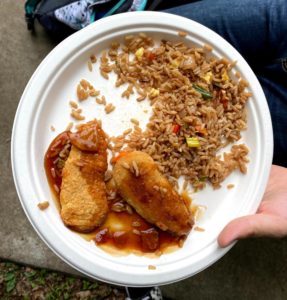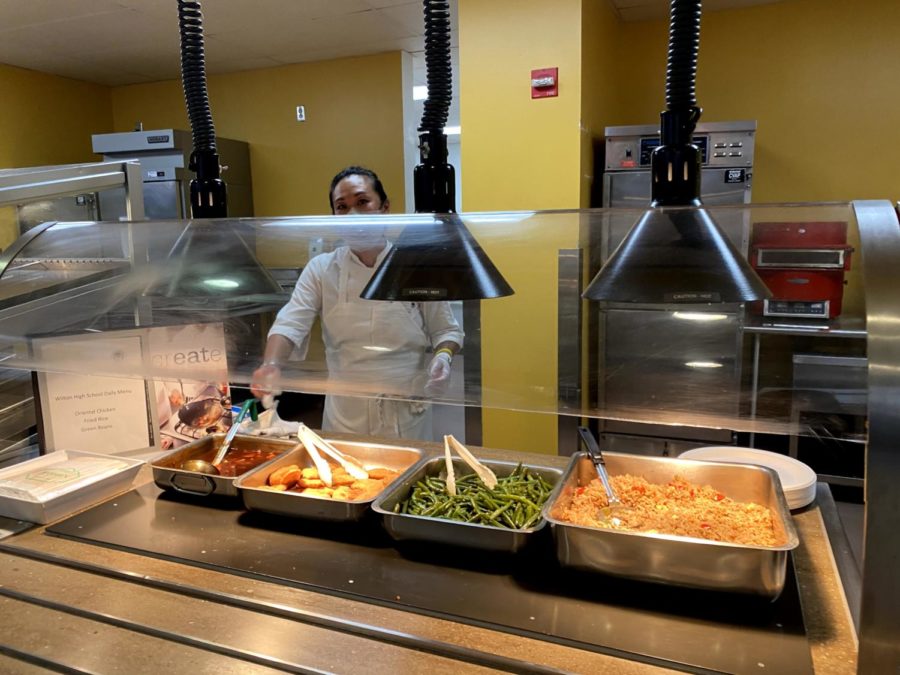Opinion: Chartwells’ Chicken – Can We Call it ‘Oriental’?
Hot meal options on September 24, 2021 at Wilton High School feature rice, chicken, and green beans.
Lunch is usually a time for students to unwind and relax, offering delicious and nutritious meals to get students through their hectic schedules. However, at one school in Connecticut, students were confused when they read the lunch menu one afternoon.
At Wilton High School in Wilton, students have been served hot meals since the beginning of the school year. Ranging from pasta and peas to burgers and fries, the lunch choices have been generally unbiased. On Thursday, September 24th, however, “Oriental Chicken” was a lunch menu option, served alongside fried rice and green beans.
Alex Wang, a junior at Wilton High School, noticed an interesting quality of the server’s.
“Besides the chopsticks only being offered for an item menu called ‘oriental’ chicken, I hope that the server being Eastern Asian is only a coincidence,” Wang said.

“Oriental” refers to an individual of the East, or of Eastern Asian descent. The term carries with it gong sounds, incense stick smells, and other inappropriate connotations that impose exotic stereotypes often directed towards Asian culture.
Moreover, these stereotypes enforce the idea that Asians can never be fully “American” because of differing appearances, languages, and culture. Despite generations of Asians living in America since the late 19th century, significantly influencing American culture, they are systematically regarded to as foreigners.
“While it’s not used as an insult or a slur, it’s a word that just doesn’t need to be used,” Wang said. “If the word is not allowed in federal documents, I’m sure Chartwells can use a dictionary.”
Even more disappointing, the chicken was sold as chicken tenders two days prior in a different recipe and under a different name. By associating the chicken tenders, an American creation, with an exotic and alluring dish, students expressed a collective feeling of shock.
But the “Oriental Chicken” at Wilton High School is not an isolated incident. Students at Oberlin College protest that the campus dining services appropriate Asian dishes and practice inaccurate and naming of foods served in their cafeterias.
Exacerbated by COVID, the epidemic of Eastern Asian stereotypes have only increased. Movements like #StopAsianHate have protested to stand against racism, collected crucial data of reported hate incidents, and spread awareness about discrimination against Asians, all with the aim of strengthening the Asian community amidst racism and violence.
Since childhood, Wang has experienced forms of discrimination, like how the food he brought from home “looked weird and funny,” just because it was different from American cuisine. He recounts jokes he had heard in middle school, like how he “shouldn’t be left alone with pets” or that Asian parents would “toss silverware down the stairs to name their children.” He found those jokes extremely distasteful, but in desperation to seem cool among his peers, didn’t say anything.
In high school, he developed a severe case of psoriasis, a genetic skin disease that causes skin inflammation around the joints. This happened around February of 2020, at the beginning of the pandemic.
“It developed on any inch of my body. When I went to swim practice, I’m sure you could imagine the amount of COVID jokes I heard,” Wang said. “Walking into the dermatologist’s office for treatment, people avoided my father and I, forming this radius that no one dared to cross.”
While one naming mistake seems innocent, the systemic discrimination towards Eastern Asians, which has fueled these incidents, is not. The Wilton Public Schools administration is working on addressing these matters.
Wilton High School, along with the three other schools in the Wilton Public Schools district, contracts with Chartwells, a food service provider that is involved with everything from designing the menus to naming the foods. Principal of Wilton High School, Dr. O’Donnell, comments on the situation, expressing his concern for cultural sensitivity.
“Anytime any student is offended, that’s a problem. We want an inclusive environment,” O”Donnell said.
After speaking with Mr. Reynolds, the Chartwells director for the whole district, and the Chartwells regional director, O’Donnell reports the steps that will be taken.
“They have served a recipe named Oriental Chicken for a number of years,” O’Donnell said. “They will change the name of the dish and the name of the recipe.”
Moving forward, the administration will make efforts to “turn the negative situation into a positive one.” They will examine other recipe names like “General Tso’s Chicken” and “Mexicali Corn,” looking into naming conventions and making adjustments when needed.
Joy Ren is a senior at Wilton High School. This year, she is so excited to fulfill the role as Editor-in-Chief of The Forum. Socially conscious and seeking a variety of experiences, she loves to write about her community under the Humans of WHS column. In her free time, nothing is more perfect than working on the Saturday crossword with a steaming mug of tea.

